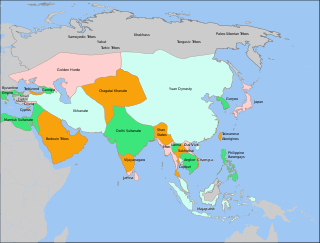
The Uzbeks are a Turkic ethnic group native to wider Central Asia, being the largest Turkic ethnic group in the area. They comprise the majority population of Uzbekistan but are also found as a minority groups in Afghanistan, Tajikistan, Kyrgyzstan, Kazakhstan, Turkmenistan, Russia and China. Uzbek diaspora communities also exist in Turkey, Pakistan, Saudi Arabia, USA, Ukraine and other countries.
Turkestan, also spelled Turkistan, is a historical region in Central Asia corresponding to the regions of Transoxiana and Xinjiang.

Kurash refers to a number of folk wrestling styles practiced in Central Asia. The English name comes from the term for "wrestling" in some Turkic language.

The Timurid dynasty, self-designated as Gurkani, was a Sunni Muslim dynasty or clan of Turco-Mongol origin descended from the warlord Timur. The word "Gurkani" derives from "Gurkan", a Persianized form of the Mongolian word "Kuragan" meaning "son-in-law". This was an honorific title used by the dynasty as the Timurids were in-laws of the line of Genghis Khan, founder of the Mongol Empire, as Timur had married Saray Mulk Khanum, a direct descendant of Genghis Khan. Members of the Timurid dynasty signaled the Timurid Renaissance, and they were strongly influenced by Persian culture and established two significant empires in history, the Timurid Empire (1370–1507) based in Persia and Central Asia, and the Mughal Empire (1526–1857) based in the Indian subcontinent.

The Timurid Empire, self-designated as Gurkani, was a Persianate Turco-Mongol empire comprising modern-day Uzbekistan, Iran, the southern region of the Caucasus, Mesopotamia, Afghanistan, much of Central Asia, as well as parts of contemporary India, Pakistan, Syria, and Turkey.

Tengri is one of the names for the primary chief deity of the early Turkic and Mongolic peoples.

Shakhrisabz is a city in Qashqadaryo Region in southern Uzbekistan located approximately 80 km south of Samarkand with a population of 100,300 (2014). It is located at an altitude of 622 m. Historically known as Kesh or Kish, Shahrisabz was once a major city of Central Asia and was an important urban center of Sogdiana, a province of the Achaemenid Empire of Persia. It is primarily known today as the birthplace of 14th-century Turco-Mongol conqueror Timur.

Turco-Mongol or the Turko-Mongol tradition was an ethnocultural synthesis that arose in Asia during the 14th century, among the ruling elites of the Golden Horde and the Chagatai Khanate.

Ahmad Yasawi was a Turkic poet and Sufi, an early mystic who exerted a powerful influence on the development of Sufi orders throughout the Turkic-speaking world. Yasawi is the earliest known Turkic poet who composed poetry in Middle Turkic. He was a pioneer of popular mysticism, founded the first Turkic Sufi order, the Yasawiyya or Yeseviye, which very quickly spread over Turkic-speaking areas. He was a Hanafi scholar like his murshid, Yusuf Hamadani.

Turkic mythology features Tengriist and Shamanist strata of belief along with many other social and cultural constructs related to the nomadic existence of the Turkic peoples in early times. Later, especially after the Turkic migration, some of the myths were embellished to some degree with Islamic symbolism. Turkic mythology shares numerous points in common with Mongol mythology and both of these probably took shape in a milieu in which an essentially nationalist mythology was early syncretised with elements deriving from Tibetan Buddhism. Turkic mythology has also been influenced by other local mythologies. For example, in Tatar mythology elements of Finnic and Indo-European mythologies co-exist. Beings from Tatar mythology include Äbädä, Alara, Şüräle, Şekä, Pitsen, Tulpar, and Zilant. The early Turks apparently practised all the then-current major religions, such as Buddhism, Christianity, Judaism and Manichaeism, before the majority converted to Islam; often syncretising these other religions into their prevailing mythological understanding.

The Mughals are a number of culturally related clans of India and Pakistan. They claim they are descended from the various Central Asian Mongol and Turkic tribes that settled in the region. The term Mughal literally means Mongolian.
Taimur was a 14th-century Southern-Central Asian Turkic-Mongolian ruler and warlord also known as Tamerlane in the western world.
Tartarian may be the adjective form of:
The Sufid dynasty was a Turkic dynasty that ruled in Khwarezm within the realm of Mongols' Golden Horde Khanate, in the Amu Darya river delta. Although the dynasty's independence was short-lived, its later members continued to rule Khwarezm intermittently as governors of the Timurid Empire until the takeover of Khwarezm by the Shaybanid Uzbeks in 1505. Unlike earlier dynasties that ruled from Khwarezm, the Sufids never used the title of Khwarezmshah.

Timur, later Timūr Gurkānī, sometimes spelled Taimur and historically best known as Amir Timur or Tamerlane, was a Turco-Mongol conqueror who founded the Timurid Empire in and around modern-day Afghanistan, Iran and Central Asia, becoming the first ruler of the Timurid dynasty. As an undefeated commander, he is widely regarded as one of the greatest military leaders and tacticians in history. Timur is also considered a great patron of art and architecture, as he interacted with intellectuals such as Ibn Khaldun and Hafiz-i Abru and his reign introduced the Timurid Renaissance.
Timur, Temür, Temir or Tömör is a Turkic and Mongolic name which literally means iron. It is a cognate of the Turkish name Demir. In Indonesian, timur translates to east, and symbolizes hope by the rising sun.









